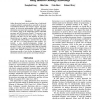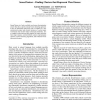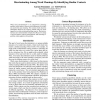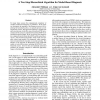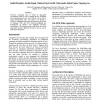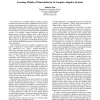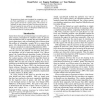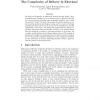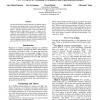AAAI
2006
14 years 1 months ago
2006
AAAI
2004
14 years 1 months ago
2004
SenseClusters is a freely available word sense discrimination system that takes a purely unsupervised clustering approach. It uses no knowledge other than what is available in a r...
AAAI
2006
14 years 1 months ago
2006
While computers have defeated the best human players in many classic board games, progress in Go remains elusive. The large branching factor in the game makes traditional adversar...
AAAI
2004
14 years 1 months ago
2004
Word sense discrimination is an unsupervised clustering problem, which seeks to discover which instances of a word/s are used in the same meaning. This is done strictly based on i...
AAAI
2006
14 years 1 months ago
2006
For many large systems the computational complexity of complete model-based diagnosis is prohibitive. In this paper we investigate the speedup of the diagnosis process by exploiti...
AAAI
2004
14 years 1 months ago
2004
Pervasive computing aims to build an aggregated environment around a user by knitting diverse computing and communicating devices and software services into a single homogeneous u...
AAAI
2006
14 years 1 months ago
2006
AAAI
2004
14 years 1 months ago
2004
We present two simple search methods for computing a sample Nash equilibrium in a normal-form game: one for 2player games and one for n-player games. We test these algorithms on m...
AAAI
2006
14 years 1 months ago
2006
We study the complexity of influencing elections through bribery: How computationally complex is it for an external actor to determine whether by a certain amount of bribing voter...
AAAI
2004
14 years 1 months ago
2004
The need for Natural Language Interfaces to databases (NLIs) has become increasingly acute as more and more people access information through their web browsers, PDAs, and cell ph...
